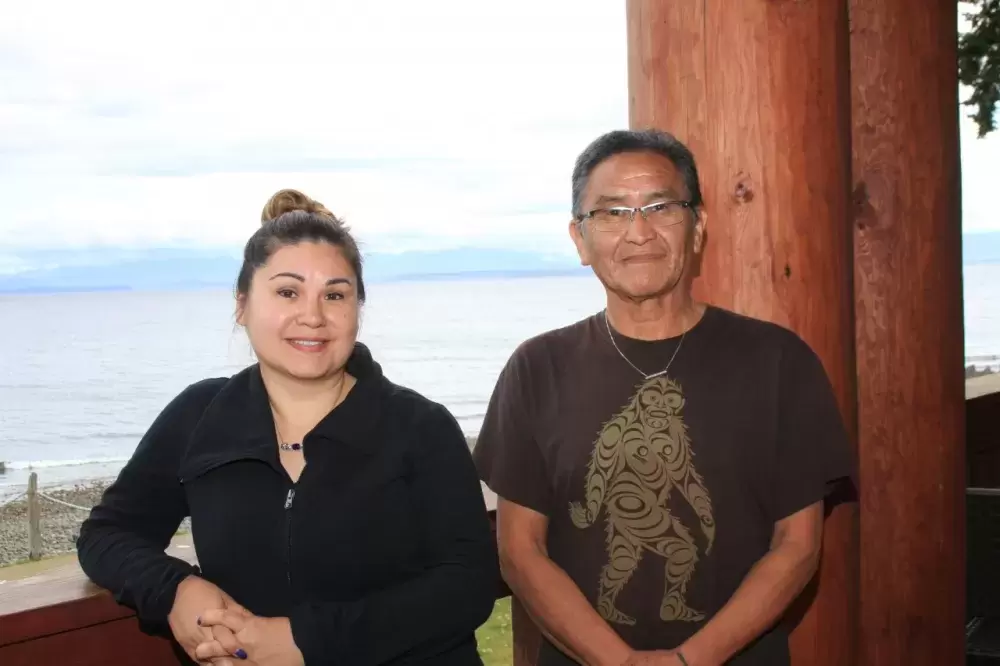When a problem arose in her youth, Gina Amos recalls advice from her grandmother to go sit by the water.
“I didn’t realise back then, but a really big important part of our teachings is to be still, to be quiet, and that can connect us to what we need to be connected with at that moment,” said Amos, a member of the Ahousaht First Nation who currently lives in Port Alberni. “No words had to be said. Our grandpa David Frank used to bring us to the water, not say nothing.”
With 12 years of experience as a counsellor, the reasoning behind these lessons from years ago didn’t become fully clear to Amos until recently, when she underwent community wellness training with 19 other Nuu-chah-nulth-aht and NTC workers. The training, which completed in May after over four intensive three-day sessions that began in November, has helped prepare Amos to work with her community, wherever she may be needed.
“I know it will help people move forward because it’s helped me, it’s helped my family,” she said. “I believe that it’s something we’ve been yearning for.”
For the last few years the Nuu-chah-nulth Tribal Council has offered this training to selected applicants willing to volunteer in a crisis situation that arises in their community. The education includes training in basic counselling, assessing a crisis situation, communication skills, bullying prevention and providing support to someone who shows risk of suicide.
Vina Robinson, manager of the NTC’s Teechuktl Mental Health department, said they began offering the training program four years ago to meet a need for people in Nuu-chah-nulth communities who have the ability to help amid trauma and panic.
“The need was there for the communities to have additional support right in the communities,” she said. “They’re learning how to assess a situation, make sound decisions in the moment.”
Two spots in the program are designated for a person in Nanaimo and Victoria to ensure support is more available in an urban setting, but the community wellness training is also relevant to Hot Springs Cove, a Hesquiaht settlement of about 60 residents north of Tofino.
“It’s a really remote and isolated community, so any resources we have there are very, very limited - especially in terms of an individual needing someone to be with them,” said Cecil Sabbas, a Hot Springs Cove resident who recently completed the wellness training. “Our little community is not immune from the social ills of larger communities, we suffer the same things. I saw a need for the little community to have someone who can be with them until the real experts come in.”
“When somebody is hurting, we can go in and say, ‘Let us take that pain for a bit, let us hang on to it,’” added Amos. “That gives them room to think clearer to be able to move on.”
An essential part of the training is teaching the participants how to care for themselves – particularly after dealing with a traumatic situation.
“We can’t help if we’re broken ourselves, so we’ve been taught in this course how to take care of ourselves,” said Sabbas. “While I have an empty cup I can’t help. I need to take care of myself and keep my cup full.”
The training is given from a distinctly Nuu-chah-nulth perspective, rooted in the inherent strength an individual can gain from their land and ancestors.
“We’re all connected somehow,” said Amos. “It’s been amazing to learn about each other and their families and to learn that we’re strong people, we’re strong as one.”
The power of prayer is part of the wellness training - yet Sabbas found that one’s prayers don’t need to be like what was instilled in him during his days at the Christie Indian Residential School.
“I went to a treatment centre 21 years ago for drugs and alcohol, and it was there that I learned about your creator as you see him. Then I realised, I can still pray - but not to your god, or your god - to my creator as I see him,” he said. “One of the things we were taught at the beginning is you need to believe, none of this works if you don’t believe.”







